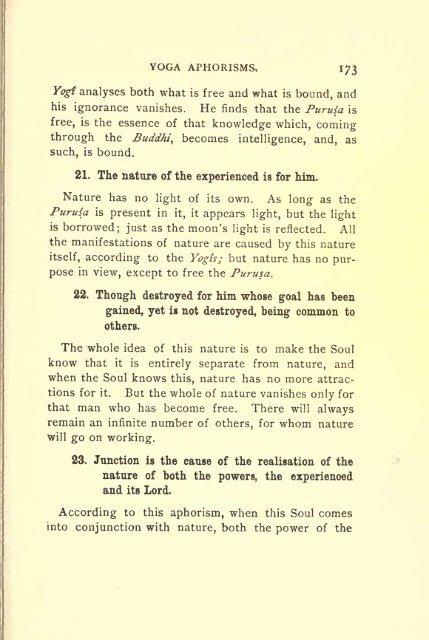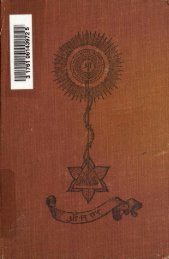- Page 3:
IIS
- Page 7:
RAjA YOGA [i]
- Page 11 and 12:
VEDANTA PHILOSOPHY RAJA YOGA BEING
- Page 13:
EACH SOUL is POTENTIALLY DIVINE. TH
- Page 16 and 17:
X PREFACE. help, and this dependenc
- Page 18 and 19:
Xii PREFACE of conversation. In the
- Page 20:
X1V CONTENTS. CHAP. III. IV. THE CH
- Page 24 and 25:
2 RAjA YOGA. all over the world, is
- Page 26 and 27:
4 RAjA YOGA. has been possible mill
- Page 28 and 29:
6 RAJA YOGA. countries, of all ages
- Page 30 and 31:
8 RAJA YOGA. of death. When he know
- Page 32 and 33:
IO RAJA YOGA. mean to say that the
- Page 34 and 35:
12 RAjA YOGA. that what he calls mi
- Page 36 and 37:
14 RAjA YOGA. Puruia all of these a
- Page 38 and 39:
16 RAjA YOGA. not be so careful in
- Page 40 and 41:
1 8 RAjA YOGA. man it may be very e
- Page 42 and 43:
" 20 RAjA YOGA. without any in
- Page 44 and 45:
" " " " "
- Page 46 and 47:
24 RAJA YOGA. than all animals, tha
- Page 48 and 49:
26 RAjA YOGA. we cannot know. At be
- Page 50 and 51:
" 28 RAJA YOGA. be an atmosphe
- Page 52 and 53:
" 3O RAjA YOGA. By what power
- Page 54 and 55:
32 RAJA YOGA. ideas stands a genera
- Page 56 and 57:
34 RAJA YOGA. nomena protruding the
- Page 58 and 59:
36 RAjA YOGA. Thus, even in the uni
- Page 60 and 61:
38 RAjA YOGA. that each part of the
- Page 62 and 63:
40 RAjA YOGA. his mind to bear, and
- Page 64 and 65:
42 RAjA YOGA. of energy, and this i
- Page 66 and 67:
44 RjA YOGA. that are on the same p
- Page 68 and 69:
46 RAjA YOGA. lump of clay being kn
- Page 70 and 71:
" " 48 RAjA YOGA. fibre c
- Page 72 and 73:
SO RAjA YOGA. changed into somethin
- Page 74 and 75:
" 52 RAjA YOGA. then no action
- Page 76 and 77:
54 RAJA YOGA. super-naturalism, the
- Page 78 and 79:
" " 56 RAJA YOGA. line. Y
- Page 80 and 81:
58 RAjA YOGA. then immediately thro
- Page 82 and 83:
60 RAjA YOGA. the Ojas is in a man
- Page 84 and 85:
" " " " "
- Page 86 and 87:
64 RAjA YOGA. horses, to stun them
- Page 88 and 89:
" 66 RAJA YOGA. which means ga
- Page 90 and 91:
68 RAjA YOGA. is of various sorts,
- Page 92 and 93:
70 RAJA YOGA. oyster, that drop wil
- Page 94 and 95:
CHAPTER VII. DHYANA AND SAMADHI. WE
- Page 96 and 97:
" " YOGA. is above consci
- Page 98 and 99:
?6 RAJA YOGA. this world would be t
- Page 100 and 101:
78 RAJA YOGA. does the science of Y
- Page 102 and 103:
" " 80 RAJA YOGA. gruity
- Page 104 and 105:
82 RAjA YOGA. Pratydhdra and Dhdran
- Page 106 and 107:
84 RAjA YOGA. themselves, it will g
- Page 108 and 109:
CHAPTER VIII. RAjA YOGA IN BRIEF. T
- Page 110 and 111:
" 88 RAjA YOGA. of all. The re
- Page 112 and 113:
90 RAjA YOGA. the body straight, le
- Page 114 and 115:
" " " " "
- Page 117:
PATANJALI S YOGA APHORISMS
- Page 120 and 121:
" 93 RAjA YOGA. man after deat
- Page 122 and 123:
100 RAJA YOGA. verse comes out, in
- Page 124 and 125:
102 RAjA YOGA. Certainly not; it is
- Page 126 and 127:
THE YOGA APHORISMS CHAPTER I. 1. No
- Page 128 and 129:
I06 RAjA YOGA. tion of the mind. A
- Page 130 and 131:
IOS RAJA YOGA. we find intellect, a
- Page 132 and 133:
IIO RAJA YOGAthe future, are alike
- Page 134 and 135:
II 2 RAjA YOGA. 9. Verbal delusion
- Page 136 and 137:
I "4 RAJA YOGA. takes that ton
- Page 138 and 139:
Il6 RAjA YOGA. ties; one is called
- Page 140 and 141:
Il8 RAjA YOGA. scientist, Patanjali
- Page 142 and 143:
120 RAjA YOGA. their minds vacant t
- Page 144 and 145: " 122 RAjA YOGA. there cannot
- Page 146 and 147: 124 RAjA YOGA. the Creator of the u
- Page 148 and 149: " 126 RAjA YOGA. acjmit, as a
- Page 150 and 151: 128 RAJA YOGA. of sound producing.
- Page 152 and 153: 130 RAJA YOGA. 29. From that is gai
- Page 154 and 155: 132 RAjA YOGA. those that are in mi
- Page 156 and 157: 134 RAJA YOGA. Prdna ; and so we se
- Page 158 and 159: 136 RAjA YOGA. a new impression in
- Page 160 and 161: 138 RAJA YOGA. 37. Or (by meditatio
- Page 162 and 163: I4O RAJA YOGA. that on which he med
- Page 164 and 165: 142 RAJA YOGA. 44. By this process
- Page 166 and 167: 144 RJA YOGA. by the external sense
- Page 168 and 169: " 146 RAjA YOGA. in the Chitta
- Page 170 and 171: 148 RAJA YOGA. Then again this stud
- Page 172 and 173: " 150 RAjA YOGA. rest. She is
- Page 174 and 175: I $2 RAjA YOGA. pleasure centre, as
- Page 176 and 177: 154 RJA YOGA. hold that it belongs
- Page 178 and 179: 156 RAjA YOsA. 10. They, to-be reje
- Page 180 and 181: 158 RAjA YOGA. these Samskdras are
- Page 182 and 183: l6o RAjA YOGA. you live in it. Only
- Page 184 and 185: 162 RAjA YOGA. says that, in the en
- Page 186 and 187: " " " 164 RAJA YOGA.
- Page 188 and 189: 166 RAjA YOGA. previous lectures, a
- Page 190 and 191: 168 RAjA YOGA. sensed by ordinary m
- Page 192 and 193: 1 70 RAJA YOGA. true. Take an infin
- Page 196 and 197: RAJA YOGA. Soul and the power of na
- Page 198 and 199: i;6 RAJA YOGA. aspects of one thing
- Page 200 and 201: 178 RAjA YOGA. in our Self, that we
- Page 202 and 203: ISO RAJA YOGA. virtues. Of course i
- Page 204 and 205: 1 82 RAjA YOGA. strength. All men o
- Page 206 and 207: 1 84 RAJA YOGA. this disease out in
- Page 208 and 209: 1 86 RAJA YOGA. the body. Prdna is
- Page 210 and 211: " 1 88 RAjA YOGA. the centres
- Page 212 and 213: RAJA YOGA. gradually succeeded in c
- Page 214 and 215: RAJA YOGA. not perfectly, because i
- Page 216 and 217: 194 RAJA YOGA. 15. The succession o
- Page 218 and 219: 196 RAjA YOGA. body, and then on th
- Page 220 and 221: 198 RAJA YOGA. 28. On the pole star
- Page 222 and 223: 200 RAjA YOGA. body. Or he can ente
- Page 224 and 225: " 202 RAJA YOGA. take a lump o
- Page 226 and 227: 204 RAJA YOGA. rejection of enjoyme
- Page 228 and 229: 206 RAjA YOGA. compounds, and yet w
- Page 230 and 231: 2O8 RAjA YOGA. much time will be lo
- Page 232 and 233: 2IO RAJA YOGA. 2. The change into a
- Page 234 and 235: 212 RAjA YOGA. effects, caused by i
- Page 236 and 237: 214 RjA YOGA. 7. Works are neither
- Page 238 and 239: 2l6 RAjA YOGA. each fresh experienc
- Page 240 and 241: 21 8 RAjA YOGA. thing is necessary
- Page 242 and 243: 220 RAjA YOGA. is a combination in
- Page 244 and 245:
22 RAjA YOGA. 30. Then knowledge, b
- Page 246 and 247:
APPENDIX. REFERENCES TO YOGA. Sveta
- Page 248 and 249:
" " " 226 RAJA YOGA.
- Page 250 and 251:
228 RAJA YOGA. 14. One whose mind h
- Page 252 and 253:
in like A FEW SIMPLE HELPS TO PRONU
- Page 254 and 255:
232 GLOSSARY. Adharma Absence of vi
- Page 256 and 257:
234 GLOSSARY. Animd Attenuation. An
- Page 258 and 259:
" " Cloud " 236 GLOS
- Page 260 and 261:
238 GLOSSARY. Bhdgavata-Purdna Bhak
- Page 262 and 263:
" " 240 / 2^"*-:4 v
- Page 264 and 265:
242 GLOSSARY. Ekdtma- Vddam Monism.
- Page 266 and 267:
> " 244 GLOSSARY. "
- Page 268 and 269:
" 246 GLOSSARY. Karma Work or
- Page 270 and 271:
" " " " "
- Page 272 and 273:
< " " " "
- Page 274 and 275:
" Om " Niyama . . I The v
- Page 276 and 277:
Making " <?., 254 GLOSS
- Page 278 and 279:
" " 256 GLOSSARY. Rig-Ved
- Page 280 and 281:
" " " 258 GLOSSARY.
- Page 282 and 283:
" lam 260 GLOSSARY. Savitarka
- Page 284 and 285:
" May " " Abode &quo
- Page 286 and 287:
" That 264 GLOSSARY. Uddna Ner
- Page 288 and 289:
266 GLOSSARY. Vedand The fine power
- Page 290 and 291:
j> Visuddha " " &q
- Page 299:
,y< ***- ,^r ; ^^c, /- :v .




